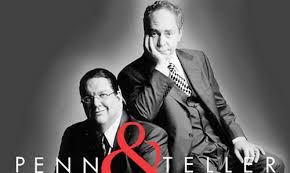This past week, I was in Las Vegas, Nevada for the National Communication Association conference. I participated in a great pre-conference on sustainable communication, saw fabulous panels in rhetoric, religion, and science, and was honored to see a former student shine at her panel on material space and architecture. In the evening, I was able to explore some of Las Vegas's shows and strip night life. I attended Penn & Teller's show at the Rio Saturday night and knew immediately that I wanted to write a post about it. In this post, I will discuss some of my favorite tricks from the show and also my thoughts about the political, social, and scientific commentary that highlighted for me the importance of educational entertainment. I do not mean to give "spoilers" or to ruin the magic for anyone, so read at your own risk.
 |
| Retrieved from this site. |
My first observation of the show was how honest and open Penn & Teller were about the art of deception. Many times, they blatantly told us what they doing and yet we were still bamboozled and confused. For example, Penn gave a speech condemning "psychics" who use tactics of cold reading to make audiences think that they have supernatural powers. Penn called out John Edward and Sylvia Browne, for example, for capitalizing on people's pain and misery in giving false hope through magic masquerading as messages from people who have passed. Penn has prepped us then, that what he is doing is really a trick. But, he does the readings so quickly and so spectacularly, it's really a wonder how he does it at all. In fact, being prepped and reminded about how the show is entirely full of tricks elevates one's awe and wonder
because it has a natural explanation. If the answer is supernatural, then it is the supernatural power that is impressive, not the artist.
 |
| Retrieved from this site. |
One of the themes of the show was represented on a sign that Teller held up during one of the tricks: "We aren't doing the trick you think we are doing." He flat out tells the audience that deception is occurring and Penn & Teller cannot be trusted, and yet the audience still falls for the trap, time and time again. My favorite trick was relatively simple in its set-up. Teller chose a woman from the audience and gave her a coin jar. He then began picking water drops from a fish tank and turned them into pennies which he placed in the jar. Even though I was in the very back corner of the mezzanine, I could still see and understand the tricks easily as they happened. The trick ended with Teller picking up a handful of pennies and dumping them back into the water. Instead of the pennies turning back into water, however, they sank to the bottom while dozens of goldfish appeared in the tank - it was truly incredible.
 |
| Retrieved from this site. |
Part of what I was not expecting was the prevalence of social and political commentary in the show. Penn & Teller are widely known as libertarians and Penn is an outspoken public atheist. One trick included a short speech by Penn about airport security using a TSA metal detector. The trick was, again, amazing, but it also gave the audience an opportunity to reflect on the sacrificing of values and the usefulness of the TSA. Penn noted that the audience member chosen to come up on stage had as much training as a real TSA agent. They also showed how inaccurate and thus unnecessary many of the practices are. My favorite part of the sketch was Penn summarizing that we should all think about how our temporary security is often valued more highly than our eternal liberty. This is the type of comedy that reminds me of Lewis Black, where the jokes are purposeful and cause us to reflect on larger social issues.
 |
| Retrieved from this site. |
This activism-comedy was also apparent in Penn & Teller's card trick. Teller performed sleight of hand magic while Penn played a guitar and told a story about "The Atheist's Deck of Cards." Based on a song by Tex Ritter, Penn & Teller tell the story about an audience member (Teller) who interrupts a physics lecture by Lawrence Krauss (who helped them write the song) and then tells a story using the cards to justify having them at the lecture. I was blown away by the amount of scientific information (which my partner, who is earning his PhD in Cosmology confirmed for me was accurate) packed into the
song. From the four fundamental interactions in nature, the cosmological constant, and the size of the universe, the audience were learning about physics while also being mesmerized by Teller's sleight of hand.
 |
| Retrieved from this site. |
I highly recommend Penn & Teller's show at the Rio. I'm not trying to advertise for them nor am I getting any reimbursement for this review. I am simply hopeful that Penn & Teller, along with other types of "edutainment" can help everyone learn more when they are not expecting it and give audiences chances for reflection and advocacy. Entertainment has aspects of education and can be harnessed to create a more active, engaged public. In a city known for its debauchery, sinfulness, and extravagance, I felt the simplicity and insight of Penn & Teller's show a welcome change of pace.
No comments:
Post a Comment